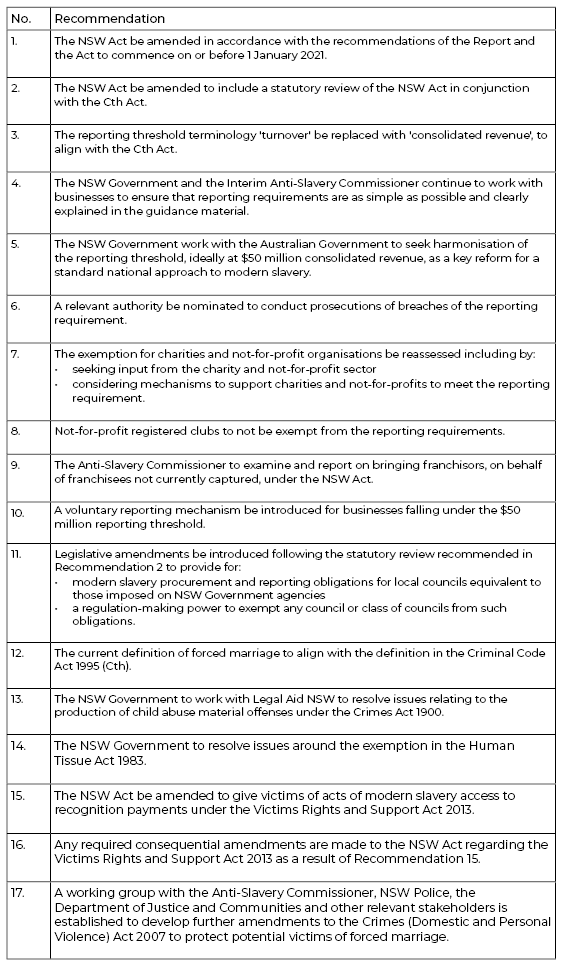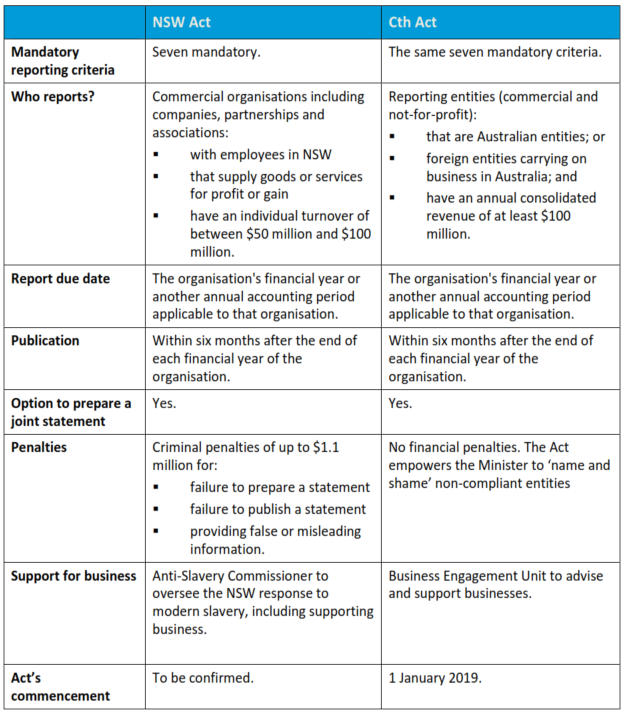
NSW Modern Slavery Act – where to next? Long-awaited report finally released
On 25 March 2020, the NSW Parliament Legislative Council Standing Committee on Social Issues (Committee) handed down its long-awaited report on the Modern Slavery Act 2018 (NSW) (NSW Act), the consultation draft of the Modern Slavery Bill 2019 (amendment Bill), and the consultation draft of the Modern Slavery Regulation 2019 (NSW) (Regulation) (Report).
Snapshot
Despite expressing its preference for a single uniform framework, the Committee supports the commencement of the NSW Act on or before 1 January 2021.
The Committee made 17 recommendations, including the following key points:
The Committee’s 17 recommendations are summarised in the below table.

It was pleasing to see that the Report directly referenced and quoted a number of the suggestions and observations put forward in our submission, which can be accessed here.
Set out below is an overview of the timeline and terms of reference of the Committee as well as a deeper dive into some of the key issues the Committee considered.
Overview of timeline
The NSW Act was introduced into parliament as a private member's bill on 8 March 2018. Following amendments in both Houses, the NSW Act was passed on 21 June 2018, but has not yet commenced.
The Commonwealth passed its own Cth Act, which commenced on 1 January 2019. An overview of the Cth Act and requirements are set out here.
The Draft Modern Slavery Amendment Bill 2019 and the Draft Modern Slavery Regulation 2019 were both released in late 2019 to address constitutional issues and other issues with the NSW Act.
The NSW Act was then referred to the Legislative Council Standing Committee on Social Issues on 6 August 2019 and shortly after called for submissions from the public and private sector, which closed on 4 October 2019.
After assessing the 102 submissions received, the Committee held a public hearing on Monday 4 November 2019 at Parliament House in Sydney.
The final Report of the Committee was tabled to Parliament on 25 March 2020.
The NSW Government is required to respond to the Report within six months, by 25 September 2020.
Terms of Reference
The terms of reference for the Committee, and those that were considered by public and private entities who made submissions, were:
Is the NSW Act still necessary?
Whether the Cth Act had made the NSW Act inoperable or redundant was a burning question the Committee considered.
The Report notes that a significant majority of stakeholders expressed the strong view that the NSW Act should be retained due to the following features of the NSW Act that are over and above the Cth Act:
On the other hand, some stakeholders were in favour of a single nationally consistent framework with one financial threshold.
The Committee noted that while it is preferable to have uniform national legislation, any national legislative regime must be sufficiently robust, and currently, the overwhelming evidence of the inquiry supports the many “world-leading features” of the NSW Act.
If two regimes are retained, will the reporting requirements be the same?
The Committee considered a number of key issues regarding the operation of dual reporting requirements, including the harmonisation of the reporting requirements for statements, the reporting threshold and related terminology, the position of charities, not-for-profit organisations and small businesses, and voluntary reporting.
It has always been the intention of the NSW and Commonwealth regime to have consistent, harmonised reporting requirements and this is reflected in the Draft Modern Slavery Regulation 2019 (Draft Regulation) – under which the NSW Act requirements for a modern slavery statement are identical to the seven mandatory criteria under the Cth Act.
The below table shows a comparison of the NSW and Commonwealth reporting requirements[1].

The Draft Regulation, prepared for public consultation, sets out how commercial organisations are to meet the requirements under the NSW Act for preparing and publishing their modern slavery statements, including:
Can I opt in to the Commonwealth regime to avoid the NSW penalties?
Some, but not all.
As noted above, under the Draft Regulation, if an entity opts in to the Commonwealth regime, it is exempt from the reporting requirements under the NSW Act (meaning the penalties for failing to prepare or submit a statement do not apply) but the NSW Act will retain penalty provisions in the NSW Act for provision of false or misleading information.
Reporting threshold
The Committee received conflicting submissions on the appropriateness of the NSW Act's reporting threshold of $50 million to $100 million.
Some stakeholders argued the lower threshold creates a compliance burden on organisations without the requisite capacity, resources and experience needed.
However, the Committee agreed with the view expressed by numerous other stakeholders that the $50-$100 million threshold be retained on the basis that:
Penalties
One of the hottest topics the Committee had to consider was whether the penalties under the NSW Act should be retained, and if so, are they appropriate.
In comparison to the whopping $1.1 million financial penalties available under the NSW Act for failing to prepare or submit a statement, or providing false or misleading information, the mere ability to be “named and shamed” by the Minister is the only ‘penalty’ for non-compliance under the Cth Act.
This is undoubtedly one of the biggest differences between the two regimes.
Not surprisingly, the Committee received submissions from the business community strongly opposing the imposition of penalties, especially given the lack of penalties under the Commonwealth.
Other submissions in support of penalties argued that a penalty regime is “best global practice” and evidence from the UK supports that a lack of enforcement and penalties led to low compliance under their Act.
Next steps
The NSW Government is required to respond within six months after which we will have clarity on the future of modern slavery in NSW, particularly with respect to the Draft Modern Slavery Amendment Bill 2019 and the Draft Modern Slavery Regulation 2019.
Authors: Scott Alden & Victoria Gordon
[1] Source: Tendered document to the Commission, Professor Jennifer Burn, Interim Anti-Slavery Commissioner, NSW Department of Premier and Cabinet, Draft NSW Modern Slavery Reporting Requirement Guidance Material, July 2019
COVID-19 response from Australian privacy regulators
Privacy Commissioners and Ombudsmen around the country appreciate that individuals, organisations and government are facing significant challenges to stop the spread of COVID-19. The use of personal information is part of addressing this public health crisis (27 March 2020). More...
COVID-19 in detention centres & prisons: A potential human rights catastrophe
Proposed NSW legislation that will allow for the early release of some prisoners is welcome, and similar legislation should be introduced in all other states and territories as a matter of urgency, says the Australian Lawyers Alliance (ALA) (24 March 2020). More...
COVID-19 Emergency laws introduced to parliament to boost community safety
The NSW Government will introduce an emergency Bill to Parliament comprising a broad range of amendments to existing laws to help combat the spread of COVID-19 (24 March 2020). More...
Court Practice Directions
Federal Court of Australia
The Federal Court is conducting hearings using Microsoft Teams technology and has released a special measures information note and a practitioners' guide to the use of this technology
High Court of Australia
Electronic filing of documents - cases commenced before 1 January 2020
High Court of Australia, 1 of 2020
Effective from 23 March 2020, For the purposes of Rule 1.07.1 of the High Court Rules 2004 documents to be filed in cases commenced before 1 January 2020 should, where possible, be forwarded as a PDF attachment to an email sent to the managing Registry
Opening of the Registry
High Court of Australia, 2 of 2020 – 20 March 2020
This Practice Direction takes effect on 23 March 2020. This Practice Direction takes effect on 23 March 2020.
Legal and Constitutional Affairs References Committee
Impact of changes to service delivery models on the administration and running of Government programs
Nationhood, national identity and democracy
Legal and Constitutional Affairs Legislation Committee
Federal Circuit and Family Court of Australia Bill 2019 [Provisions] and Federal Circuit and Family Court of Australia (Consequential Amendments and Transitional Provisions) Bill 2019 [Provisions]
Crimes Legislation Amendment (Combatting Corporate Crime) Bill 2019
NSW Bar Association – Court arrangements
New South Wales Bar Association's consolidated guide to the various COVID-19-related Court arrangements in NSW and Federal Courts and Tribunals. The guide covers information for those attending court as well as up to date information on procedural changes being made in view of the coronavirus pandemic in the various jurisdictions. The guide has been updated and includes updates (27 March 2020) from
The NSW Court of Appeal
The Local Court of NSW
The Childrens Court of NSW
The Workers Compensation Commission.
Updated changes to NCAT operations
Regarding hearing and filing arrangements now including new Procedural Direction 6 regarding filing of documents and a Guideline concerning temporary arrangements for lodging documentation. NCAT has advised that any further changes to its services will be announced on its Coronavirus (COVID-19) web page (27 March 2020). More...
NSW Court of Appeal Decisions
NSWCA Decisions before the High Court as at 27 March 2020
COVID-19 Procedural changes at the Sydney District Court
The Chief Judge of the District Court has issued a note regarding procedural changes in response to concerns about the spread of coronavirus, commencing Wednesday 18 March 2020.
Supreme Court - Coronavirus update
The Chief Justice has issued updated information relating to procedural changes in light of the latest Coronavirus recommendations. The changes will take effect from Monday 23 March. More...
New Jury Trials to be temporarily suspended from Monday, 16 March 2020
Supreme Court of New South Wales and District Court of New South Wales
The Chief Justice, the Hon TF Bathurst AC, and Chief Judge of the District Court, the Hon D Price AM, announced that due to the coronavirus (COVID-19) new jury trials commencing across NSW from Monday, 16 March 2020, will be temporarily suspended whilst the empanelment process is reviewed and steps are taken to seek to limit the close social contact amongst jurors which is a feature of jury trials. Current trials, where a jury has already been selected and empanelled, will continue.
IPC COVID-19 Update
The IPC is moving to a new telephone system and during the transition, email will be the most reliable means of contacting us (27 March 2020). More...
IPC: New report shows access to government information growing and future challenges
The NSW Information Commissioner, Information and Privacy Commission (IPC) CEO and NSW Open Data Advocate, Ms Elizabeth Tydd, released the ninth annual Report on the Operation of the Government Information (Public Access) Act 2009 (GIPA Act) 2018 - 2019 (‘the Report’), which has now been tabled in Parliament (17 March 2020). More...
Consultations
The NSW Government is seeking submissions on potential reforms to allow NSW courts to set aside historical settlement agreements for child abuse. Submissions close on 15 April 2020. More...
Hansen v Commissioner of Police [2020] NSWCATAD 89
ADMINISTRATIVE LAW – public access to government information– personal information – whether prejudice to the effective exercise of an agency’s functions – whether prejudice to a deliberative process – balancing public interest considerations
ECV v Public Guardian [2020] NSWCATAD 86
ADMINISTRATIVE REVIEW — Decision by Public Guardian as guardian under guardianship order— Place of accommodation of subject person — Obligations of decision maker under Guardianship Act 1987 — Principles in section 4; decision under review remained the correct and preferable decision.
Edward Lees Imports Pty Ltd v Department of Finance Services and Innovation t/as Commissioner of Fair Trading [2020] NSWSC 256
ADMINISTRATIVE LAW — statutory requirement for procedural fairness — Motor Dealers and Repairers Act 2013 (NSW) s 41 — whether s 41 binds the Tribunal when reviewing determinations made under the Act
ADMINISTRATIVE LAW — procedural fairness — Notice — Particulars of case against applicant — disciplinary action under Motor Dealers and Repairers Act 2013 (NSW) — where disciplinary action must be commenced by show cause notice — where new matters not particularised in show cause notice introduced at hearing — whether introduction of new matters was a denial of procedural fairness
Sharman v Commissioner for Fair Trading, Department of Finance, Services and Innovation [2020] NSWCATOD 26
ADMINISTRATIVE LAW – administrative review – licensing – whether applicant meets requirements for Issue of supervisor certificate - application of Instrument as policy – experience requirements not met – not unfair or unjust to apply policy – whether applicant a fit and proper person to hold the certificate
Tebb v State of NSW [2020] NSWCATAD 85
HUMAN RIGHTS — discrimination — whether power to dismiss complaint summarily under s 102 of the Anti-Discrimination Act 1977 should be exercised WORDS AND PHRASES — meaning of “misconceived” and “lacking in substance” HUMAN RIGHTS — discrimination — factors relevant to power to amend complaint under s 103 of Anti-Discrimination Act 1977 (NSW)
AIG Australia Ltd & NM Insurance Pty Limited v Commissioner of Police [2020] NSWCATAD 84
ADMINISTRATIVE REVIEW. Government Information (Public Access) – public interest considerations in favour of disclosure – public interest considerations against disclosure – personal factors of the application – weight of evidence. Reveal personal information. Contravene an information protection principle.
McAuliffe v The Transport Secretary on behalf of the State Transit Authority [2020] NSWIRComm 1017
PUBLIC SECTOR DISCIPLINARY APPEAL – Bus Operator – use of mobile phone while on duty – whether conduct amounted to misconduct warranting termination of employment – misconduct established - dismissal disproportionate to misconduct – no back pay – employer entitled to expect compliance with policies and procedures – nature and gravity of conduct, length of service, remorse and contrition and employment record considered
Proclamations commencing Acts
Justice Legislation Amendment Act (No 2) 2019 No 20 (2020-97) — published LW 19 March 2020
Proclamation is to commence the following provisions of the Justice Legislation Amendment Act (No 2) 2019—(a) amendments to the Bail Act 2013 relating to the making of bail decisions and the enforcement of bail requirements,(c) amendments to the Sheriff Act 2005 relating to the powers of sheriff’s officers when executing certain arrest warrants,
Regulations and other miscellaneous instrument
Public Health Amendment (Penalty Notices) Regulation 2020 (2020-109) — published LW 25 March 2020
Children’s Court Amendment Rule 2020 (2020-99) — published LW 20 March 2020
Supreme Court (Amendment No 432) Rule 2020 (2020-95) — published LW 17 March 2020
Amendment of Supreme Court Rules 1970Part 65C Admission as legal practitioner
Bills
COVID-19 Legislation Amendment (Emergency Measures) Bill 2020
Assented - Act No 1 of 2020
Justice
Amendments to the Criminal Procedure Act, the Evidence (Audio and Audio Visual Links) Act, the Crimes (Domestic and Personal Violence) Act and the Jury Act aim to ensure NSW courts can continue to deliver justice with fewer people required to physically attend court. The Supreme and District Courts will have greater discretion to order judge-alone trials reducing the need to summon large numbers of potential jurors. Vulnerable people will be exempt from jury summons. A greater reliance on technology, including increased use of audio visual links and pre-recording evidence of key witnesses, will also help maintain social distancing in our courtrooms, as will the extension of provisional Apprehended Domestic Violence Orders from 28 days to six months.
Bills passed by both Houses of Parliament – 27 March
Better Regulation and Customer Service Legislation Amendment (Bushfire Relief) Bill 2020
Bills assented to
Better Regulation and Customer Service Legislation Amendment (Bushfire Relief) Act 2020 No 3 — Assented to 25 March 2020
For the full text of Bills, and details on the passage of Bills, see Bills.
Disclaimer
The information in this publication is of a general nature and is not intended to address the circumstances of any particular individual or entity. Although we endeavour to provide accurate and timely information, we do not guarantee that the information in this newsletter is accurate at the date it is received or that it will continue to be accurate in the future.
Published by: